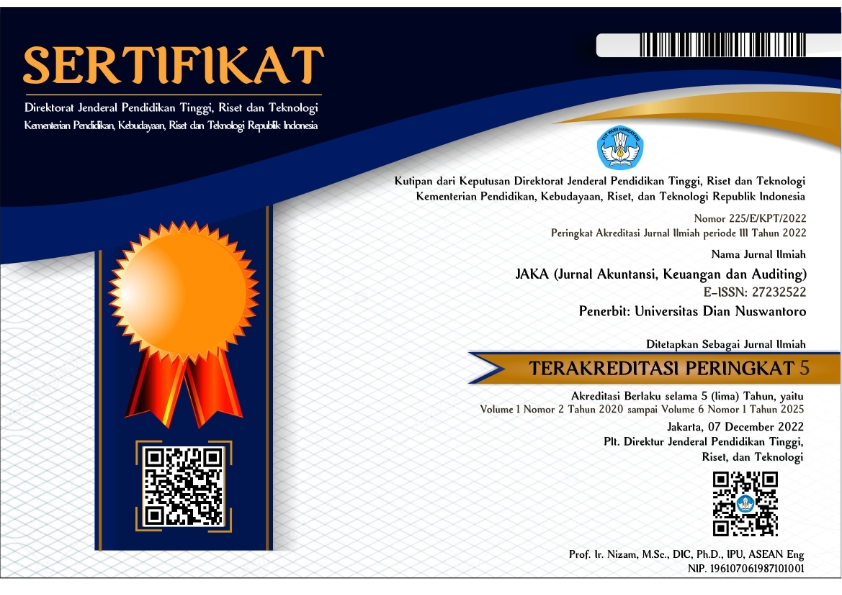Pengaruh Upah Minimum, Tingkat Pendidikan, Inflasi Dan Covid-19 Terhadap Penyerapan Tenaga Kerja Kabupaten/Kota Provinsi Bali
DOI:
https://doi.org/10.56696/jaka.v3i2.8808Abstract
Absorption of labor is one of the important factors in overcoming the problem of unemployment and to support economic development that is being carried out by developing countries in order to create equitable economic development. The research locations are in the districts/cities of Bali Province with secondary data obtained from the publications of the Central Bureau of Statistics (BPS). The number of observations in this study were 108 observations with a period of 12 years and involved 9 regencies/cities of Bali Province using the observation method, as well as using descriptive analysis techniques and panel data regression analysis. The results of the panel data regression test show that the most appropriate chosen model is the random effect model (REM). The results of the study found that the minimum wage, level of education, inflation and Covid-19 have a simultaneous effect on employment in districts/cities of Bali Province. Partially the minimum wage variable has a positive and significant effect on employment absorption in districts/cities of Bali Province. The level of education and inflation have no positive and insignificant effect, and Covid-19 has a significant effect on employment in districts/cities of Bali Province.References
Aslan, A., Darma, D. C., & Wijaya, A. 2019. Have Village Funds Impact Growth Economy and Poverty Rate. International Journal of Scientific & Technology Research. 8(10) hal 2601–2605.
Badan Pusat Statistik Provinsi Bali. 2014. Keadaan Ketenagakerjaan Provinsi Bali Tahun 2014.
Badan Pusat Statistik Provinsi Bali. 2021. Upah Minimum Kabupaten/Kota.
Badan Pusat Statistik Provinsi Bali. 2021. Penduduk Usia 15 Tahun Ke Atas.
Boediono. 1992. Teori Ekonomi Makro. Jogjakarta: BPFE UGM.
Emilia Herman. 2015. The Impact of Economic Growth Process on Employment in European Union Countries. The Romanian Economic Journal. 1(4) hal 47-67.
Feldstein, M. 2017. Underestimating The Real Growth Of GDP, Personal Income, And Productivity. Journal Of Economic Perspectives, 31(2) hal 145–164.
Ganie, Djupiansyah. 2017. Analisis Pengaruh Upah, Tingkat Pendidikan, Jumlah Penduduk, dan PDRB Terhadap Penyerapan Tenaga Kerja di Kabupaten Berau Kalimantan Timur. Jurnal Eksekutif. Vol. 14 No.2
Gideon Kiguru Thuku, Gachanja Paul and Obere Almadi. 2013. The Impact of Population Change on Economic Growth In Kenya. Bulletin of Indonesian Economic Studies. 2(6) hal 43-60.
Mankiw N. Gregory. 2021. Principles Of Economics Ninth Edition. USA: Cengange.
Prasetyo Riza Bagus. 2021. Analisis Pengaruh PDRB, Inflasi, Upah Minimum, Dan Pendidikan Terhadap Penyerapan Tenaga Kerja Di Pulau Jawa Tahun 2004- 2020. Jurnal Ilmiah Hal 1-18.
Rifai, Muhammad Faisal. 2017. Pengaruh PDRB, Investasi, Inflasi dan Upah Minimum Terhadap Penyerapan Tenaga Kerja di Kota Semarang (1995- 2015). Skripsi.Semarang: Universitas Diponegoro.
Sadono Sukirno. 2013. Mikroekonomi Teori Pengantar Edisi Ketiga. Jakarta: Raja Grafindo Persada.
Siti Nur Aishah Mohd Hashim. 2016. Minimum Wage Policy Efiects on Economic Growth. International Joumal of Economics and Management Sciences. 4(9) hal 1-21.
Sugiharti, Rr. Retno., & Kurnia, Akhmad Syakir. 2018. “Gender Wage Gap and Education: Case in Indonesia’s Labor Market”. E3S Web of Conferences 73, 11019 (2018).
Teixeira, A. A. C., & Queiros, A. S. S. 2016. Econoomic Growth , Human Capital And Structural Change : A dynamic panel data analysis. Research Policy. 45(8) hal 1636-1648.
Purnamawati, Dina Listri dan Rifki Khoirudin. 2019. Penyerapan Tenaga Kerja Sektor Manufaktur di Jawa Tengah 2011-2015. Jurnal REP (Riset Ekonomi Pembangunan). 4(1) hal 41-52.
Downloads
Published
How to Cite
Issue
Section
License
Copyright (c) 2023 JAKA (Jurnal Akuntansi, Keuangan, dan Auditing)

This work is licensed under a Creative Commons Attribution-ShareAlike 4.0 International License.












